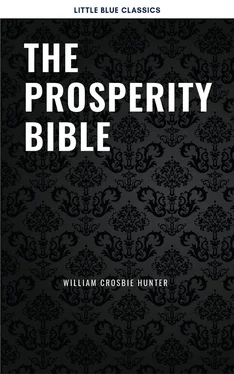They may be necessary for the time being, but do not fail to look upon them as a necessary evil; and even when you lay them before you, refer to them only when compelled to do so. Make your notes as full as you please in preparation, but by all means condense them for platform use.
Extemporaneous Speech
Surely this is the ideal method of delivery. It is far and away the most popular with the audience, and the favorite method of the most efficient speakers.
"Extemporaneous speech" has sometimes been made to mean unprepared speech, and indeed it is too often precisely that; but in no such sense do we recommend it strongly to speakers old and young. On the contrary, to speak well without notes requires all the preparation which we discussed so fully in the chapter on "Fluency," while yet relying upon the "inspiration of the hour" for some of your thoughts and much of your language. You had better remember, however, that the most effective inspiration of the hour is the inspiration you yourself bring to it, bottled up in your spirit and ready to infuse itself into the audience.
If you extemporize you can get much closer to your audience. In a sense, they appreciate the task you have before you and send out their sympathy. Extemporize, and you will not have to stop and fumble around amidst your notes—you can keep your eye afire with your message and hold your audience with your very glance. You yourself will feel their response as you read the effects of your warm, spontaneous words, written on their countenances.
Sentences written out in the study are liable to be dead and cold when resurrected before the audience. When you create as you speak you conserve all the native fire of your thought. You can enlarge on one point or omit another, just as the occasion or the mood of the audience may demand. It is not possible for every speaker to use this, the most difficult of all methods of delivery, and least of all can it be used successfully without much practise, but it is the ideal towards which all should strive.
One danger in this method is that you may be led aside from your subject into by-paths. To avoid this peril, firmly stick to your mental outline. Practise speaking from a memorized brief until you gain control. Join a debating society—talk, talk , TALK , and always extemporize. You may "make a fool of yourself" once or twice, but is that too great a price to pay for success?
Notes, like crutches, are only a sign of weakness. Remember that the power of your speech depends to some extent upon the view your audience holds of you. General Grant's words as president were more powerful than his words as a Missouri farmer. If you would appear in the light of an authority, be one. Make notes on your brain instead of on paper.
Joint Methods of Delivery
A modification of the second method has been adopted by many great speakers, particularly lecturers who are compelled to speak on a wide variety of subjects day after day; such speakers often commit their addresses to memory but keep their manuscripts in flexible book form before them, turning several pages at a time. They feel safer for having a sheet-anchor to windward—but it is an anchor, nevertheless, and hinders rapid, free sailing, though it drag never so lightly.
Other speakers throw out a still lighter anchor by keeping before them a rather full outline of their written and committed speech.
Others again write and commit a few important parts of the address—the introduction, the conclusion, some vital argument, some pat illustration—and depend on the hour for the language of the rest. This method is well adapted to speaking either with or without notes.
Some speakers read from manuscript the most important parts of their speeches and utter the rest extemporaneously.
Thus, what we have called "joint methods of delivery" are open to much personal variation. You must decide for yourself which is best for you, for the occasion, for your subject, for your audience—for these four factors all have their individual claims.
Whatever form you choose, do not be so weakly indifferent as to prefer the easy way—choose the best way, whatever it cost you in time and effort. And of this be assured: only the practised speaker can hope to gain both conciseness of argument and conviction in manner, polish of language and power in delivery, finish of style and fire in utterance.
QUESTIONS AND EXERCISES
1. Which in your judgment is the most suitable of delivery for you? Why?
2. What objections can you offer to, ( a ) memorizing the entire speech; ( b ) reading from manuscript; ( c ) using notes; ( d ) speaking from memorized outline or notes; ( e e) any of the "joint methods"?
3. What is there to commend in delivering a speech in any of the foregoing methods?
4. Can you suggest any combination of methods that you have found efficacious?
5. What methods, according to your observation, do most successful speakers use?
6. Select some topic from the list on page 123, narrow the theme so as to make it specific (see page 122), and deliver a short address, utilizing the four methods mentioned, in four different deliveries of the speech.
7. Select one of the joint methods and apply it to the delivery of the same address.
8. Which method do you prefer, and why?
9. From the list of subjects in the Appendix select a theme and deliver a five-minute address without notes, but make careful preparation without putting your thoughts on paper.
NOTE: It is earnestly hoped that instructors will not pass this stage of the work without requiring of their students much practise in the delivery of original speeches, in the manner that seems, after some experiment, to be best suited to the student's gifts. Students who are studying alone should be equally exacting in demand upon themselves. One point is most important: It is easy to learn to read a speech, therefore it is much more urgent that the pupil should have much practise in speaking from notes and speaking without notes. At this stage, pay more attention to manner than to matter—the succeeding chapters take up the composition of the address. Be particularly insistent upon frequent and thorough review of the principles of delivery discussed in the preceding chapters.
17
THOUGHT AND RESERVE POWER
Providence is always on the side of the last reserve.
—Napoleon Bonaparte.
So mightiest powers by deepest calms are fed,
And sleep, how oft, in things that gentlest be!
—Barry Cornwall,
The Sea in Calm .
What would happen if you should overdraw your bank account? As a rule the check would be protested; but if you were on friendly terms with the bank, your check might be honored, and you would be called upon to make good the overdraft.
Nature has no such favorites, therefore extends no credits. She is as relentless as a gasoline tank—when the "gas" is all used the machine stops. It is as reckless for a speaker to risk going before an audience without having something in reserve as it is for the motorist to essay a long journey in the wilds without enough gasoline in sight.
But in what does a speaker's reserve power consist? In a well-founded reliance on his general and particular grasp of his subject; in the quality of being alert and resourceful in thought—particularly in the ability to think while on his feet; and in that self-possession which makes one the captain of all his own forces, bodily and mental.
The first of these elements, adequate preparation, and the last, self-reliance, were discussed fully in the chapters on "Self-Confidence" and "Fluency," so they will be touched only incidentally here; besides, the next chapter will take up specific methods of preparation for public speaking. Therefore the central theme of this chapter is the second of the elements of reserve power—Thought.
Читать дальше












